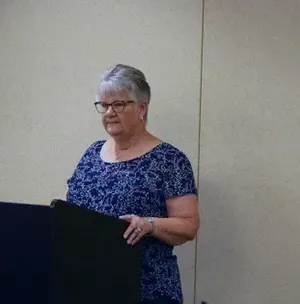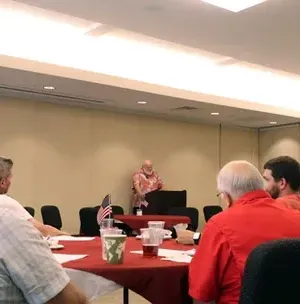Ashland, OH – At the Ashland County GOP luncheon today, the featured speaker, Ashland County Municipal Court Judge John Good, delivered an in-depth, 50-minute address focusing on the state of the local judicial system, crime trends, and the growing challenges faced by the community. The event, held at the Brethren Care Village Wellness Center, was attended by a diverse group of community leaders, law enforcement officials, and local residents.
The judge, known for his candid remarks, addressed a range of issues impacting the local community, from public safety to challenges in the legal system.
Judge Good began his speech with a disclaimer, noting that he had only been invited to speak a few days prior. Despite the short notice, he offered a comprehensive overview of the Municipal Court’s activities over the past year, touching on various aspects of crime and court operations.
2023 Municipal Court Report: A Snapshot of Local Justice
Judge Good highlighted that the Municipal Court handled over 13,000 cases in 2023, ranging from minor misdemeanor traffic offenses to more serious domestic violence and misdemeanor drug cases. Civil cases also saw significant activity, with around 125 evictions and approximately 1,000 new civil cases, including small claims.
One notable trend was the substantial increase in post-judgment actions, particularly in collection cases. “We had a massive increase in collections cases filed in 2023, most of which stemmed from bad credit card debt,” Judge Good explained. This surge, he noted, is likely a reflection of the current economic climate.
The Evolving Drug Crisis: Progress and New Challenges
A significant portion of Judge Good’s speech focused on the local drug crisis. He acknowledged progress in reducing heroin overdoses, attributing the decrease to a shift in drug preferences among users. “Heroin use is down, largely due to the fear of fentanyl contamination,” Judge Good said. However, this has led to an increase in methamphetamine and cocaine cases.
Fentanyl remains a pervasive threat, with Judge Good noting that the deadly opioid is being found in a variety of other drugs, including marijuana. “We’re seeing marijuana laced with fentanyl, and probationers are testing positive for it without even realizing they’ve been exposed,” he warned.
Vivitrol Program: A Lifeline for Opiate Addicts
Judge Good praised the local Vivitrol program, which he believes has played a crucial role in reducing fatal overdoses in Ashland County. The program, administered by the Ashland County Sheriff’s Office, provides inmates with access to Vivitrol, a medication that blocks the effects of opioids. “I personally know people who I believe would be dead if it weren’t for this program,” he remarked.
However, Judge Good also pointed out challenges associated with the program, particularly the high cost and the logistical difficulties faced by participants in accessing their monthly injections. He mentioned a recent initiative funded by COVID relief and opioid settlement money to provide transportation for those needing Vivitrol shots and other addiction-related services.
Crime Trends and Court Challenges
Judge Good also addressed other crime trends affecting the community, including an increase in thefts, particularly at self-checkout stations in local stores. He noted that thefts at Walmart have become more prevalent, often involving schemes where inexpensive items are scanned in place of higher-priced merchandise.
He also touched on the impact of recent low-income housing developments on crime rates, particularly in areas near Walmart and Home Depot. “The new housing developments have led to an increase in theft and other criminal activities in those areas,” Judge Good observed, emphasizing the broader social costs associated with such projects.
State-Level Issues: The Burden on Local Courts
In a passionate critique, Judge Good expressed frustration with state policies that have increased the burden on local courts and jails. He criticized the state for reducing prison sizes and closing mental health facilities, which has resulted in more felons and mentally ill individuals being housed in the county jail.
“Our jail is not a detox center, nor is it a mental health facility, yet we’re forced to use it as both,” Judge Good said, highlighting the overcrowded conditions at the county jail, which currently houses 126 inmates, well above its intended capacity of 117.
Looking Ahead: A Call for Community Action
Judge Good urged the community to remain vigilant and proactive in addressing these ongoing challenges. He emphasized the importance of local support for law enforcement and the justice system, as well as the need for continued innovation in tackling issues like drug addiction and crime.
“Our community has made significant strides, but there’s still much work to be done,” Judge Good stated. “We must continue to adapt and find new ways to support those in need while ensuring the safety and well-being of our citizens.”
Judge Good speech acknowledge Ashland’s reputation as one of the safest college towns in the United States, as reported by a magazine ranking Bowling Green and Ashland as the top two safest college towns in Ohio. However, the judge pointed out that despite this positive recognition, Ashland faces ongoing challenges, particularly with crime and public safety.
Crime and Public Safety in Ashland
Judge Good expressed his frustration with the increasing number of high-speed chases and criminal activity spilling into Ashland from other areas. He recounted several incidents where fugitives and criminals from neighboring cities ended up in Ashland, often leading to dramatic confrontations. “It amazes me that criminals keep coming here,” Good remarked, noting the reputation Ashland has built for its strict law enforcement and saturation policing.
Challenges with Non-English Speaking Defendants
Another significant issue Judge Good discussed was the growing number of non-English-speaking defendants appearing in his court, particularly those involved in traffic offenses. The judge detailed the complexities and costs associated with providing certified translators, as required by the Ohio Supreme Court. “Yesterday, I had 13 Spanish-speaking individuals come through my court for arraignment,” he said, explaining that the court must hire a certified translator for each hearing, which incurs significant costs.
Distracted Driving and the New Handheld Electronic Device Statute
Judge Good also discussed the new Ohio statute on handheld electronic devices, which prohibits the use of such devices while driving, except under specific conditions. He criticized the law for being poorly written and difficult to enforce, noting the numerous exceptions that make it challenging for both law enforcement and the courts to handle these cases effectively. “Distracted driving is a big problem in Ohio, but the penalties under this new law are minimal,” he stated, highlighting the loopholes that allow offenders to avoid significant consequences.
Dangerous Dogs and the Role of the Dog Warden
The issue of dangerous dogs was another key topic in Judge Good’s speech. He commended the recent appointment of Deputy Curtis Hall the new dog warden in Ashland County and expressed hope that there will be more rigorous enforcement of laws concerning dangerous and vicious dogs. Citing several recent incidents where pit bulls attacked residents and pets, Judge Good stressed the need for stricter regulations and enforcement to protect the community.
The Amish and Buggy Lighting Enforcement
The judge acknowledged the respectful but firm defiance of the Amish, who viewed the lighting requirement as an insult to their faith. “They were not going to be told by the government that they had to comply,” he explained, noting that this created a unique challenge for the court.
Judge Good concluded his speech by emphasizing the importance of maintaining Ashland’s reputation as a safe and law-abiding community while navigating the complexities of these various legal and social issues. His remarks were well-received by the attendees, who appreciated his forthright discussion of the challenges facing Ashland County.
Amish Decision by Judge Good.pdf 2023 Municipal Court Report.pdf
























